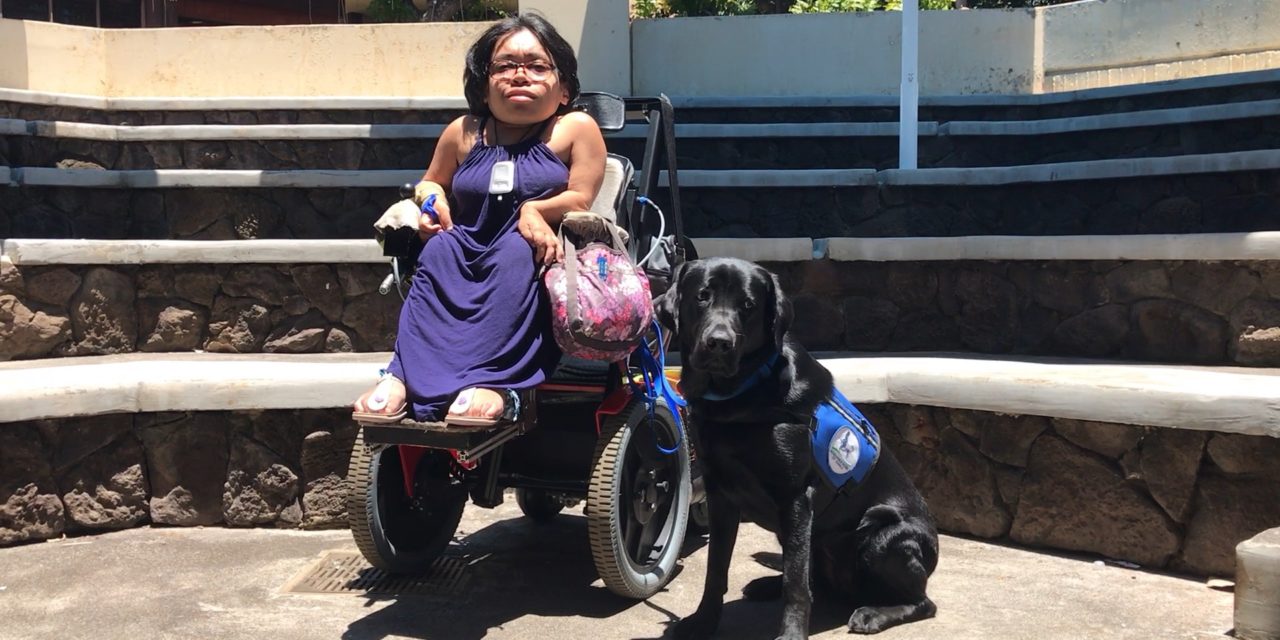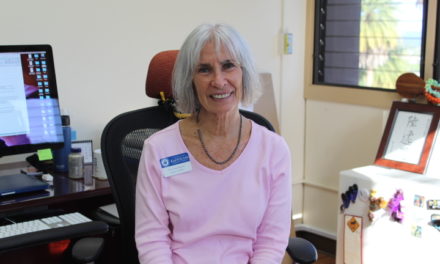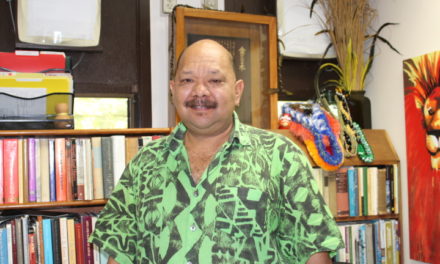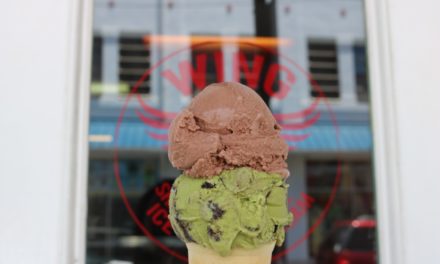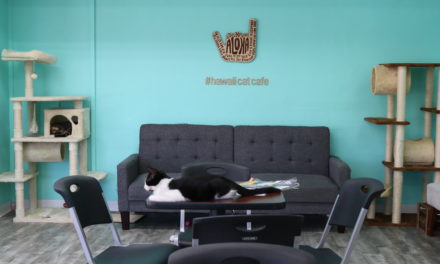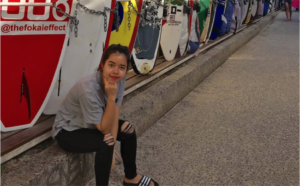By Gavin Arucan | Staff Writer
Traveling via motorized wheelchair and standing at a mere 3-foot, 2-inches tall, Maria McClellan is no stranger to curious stares and surprised glances. McClellan, despite her short stature and rare disability, attends KCC and leads an accomplished life.
“A lot of people will stare and make a few comments when they see a little person in a chair,” McClellan said. “But I prefer that someone straight up asks me a question about my disability rather than just stare at me. I’ve had people staring at me walk into a street sign because they were walking backwards. I’m very open about my disability.”
Having moved to Kaimukī from Vermont four years ago, the 25-year-old has been taking two or three classes per semester at KCC ever since. Though she attended high school in Vermont and is originally from the East Coast, she has been familiar with Hawaiʻi for the majority of life because she would spend her summer and spring breaks with her grandparents in the islands.
McClellan was born with Morquio Syndrome, a rare birth defect that results in a body being unable to break down certain materials such as chains of sugar molecules. However, since Morquio Syndrome is a progressive disease, nobody knew she had it until she was over 1 year old, when she didn’t recover from a fall as quickly as she should have. Her disability wasn’t actually too obvious until she was around 3 years old.
McClellan stopped growing when she was an 8-year-old and has had five major operations throughout her life. Her bones are not only short but crooked as well, and she said she’s also hard of hearing.
McClellan is one of only two people in Hawaiʻi and one of around 300 in the United States who have Morquio Syndrome. Because Morquio Syndrome isn’t as well known and as well studied as other, more common diseases, McClellan is dedicated to raising awareness for the disability as the president of the Hawaiʻi chapter for the non-profit organization, Little People of America.
“I’m actually glad that I have this disability,” McClellan said. “I have made a lot of friends that I don’t think I would have made otherwise. Not just with people with the same disability, but with other types too.”
Little People of America allows McClellan to meet and befriend others in the community who deal with similar problems. As the president of the Hawaiʻi chapter, she is working to make Morquio research more common since it gets less attention as more common problems like cancer. McClellan has organized three conferences on Morquio Syndrome so far.
“The majority of research on rare diseases is being funded by fundraisers held by families with the condition themselves, whereas with something more common, like cancer and diabetes, it’s more common to get those big donors,” McClellan said.
The Hawaiʻi chapter of Little People of America, or Ka Poʻe Liʻiliʻi ʻo Hawaiʻi, will be celebrating its 20th anniversary on July 8 and will be flying in Dr. William Mackenzie, who specializes in orthopedics, from Delaware to consult local families about their disabilities.
McClellan enjoys making it out to other events in the community as well. She once attended an event on campus in which the deaf community was able to get together and talk about the struggles each of them face and the comments they sometimes receive. Despite considering her being hard of hearing as a relatively minor part of her disability, she enjoyed the opportunity to spend time with people she related to and felt “less isolated.”
While McClellan has her fair share of issues, she remains humble about it all.
“There are some days where it is kind of tough, but I don’t know life any other way, so I can’t really say that it’s any harder than what everyone else goes through,” she said. “We all have different challenges whether or not you have a medical condition. It’s not something to feel sorry about. Negative things happen to everybody regardless, and we tend to forget that. My brother is 6-feet tall, and he has no disability, [but] he has in own set of challenges. It’s just a different type of challenge.”
From a young age, McClellan has had a an affection for creating art. She practices drawing, watercolor, origami, and working with anything that she “can put her hands on” on a nearly daily basis. Her parents, being artists themselves, always encouraged her to be creative and practice art.
“If I don’t do art, my day is not right,” said McClellan.
McClellan also loves taking her service dog, Shadow, on walks, which can be difficult and dangerous at times due to Kaimukī’s lack of sidewalks.
When it comes to school, McClellan, who is majoring in liberal arts, likes the “sense of community” that KCC exudes.
“Everyone is always looking out for one another,” she said. “A lot of other students are very nice and help me open doors that aren’t automatic around campus.”
McClellan gets to school via the #3 bus or is dropped off by her mother. While she can’t attend too many courses because of her medical circumstances, and she once had to miss a semester due to a major operation, McClellan enjoys the classes she takes. One of McClellan’s favorite classes at KCC is American Sign Language, which has aided her around the house with her family.
“Maria is one of the most giving friends I have ever known,” said Sabrina Kinsbury, McClellan’s good friend and fellow KCC student. “She and her mom open their home to me so early and so often. As far as school, she has some medical setbacks but she is persistent and committed to getting her work in on time as often as possible.”

